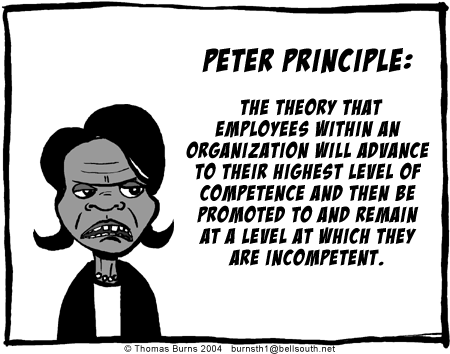•→ Safety at Work ⇐
10 ‘WORK’ Expressions in English ↓
‘overworked’ / ‘dirty work’ / ‘get worked up’ / ‘work out’ / ‘ work on’ / ‘ work up an appetite’ / ‘workaholic’ / ‘work it’ / ‘work … in’ / ‘work something out’• Employment & Jobs vocabulary … →[Elem]← / / →[Adv]←
♦ Asking About Occupations ↓
♦ Essential Job Vocabulary ↓
∞ ‘Job’ or ‘Work’ ⇒[quiz#1] ⇔ [quiz#2]⇐ / quiz#3⇒
•→Job collocations ⇐[+ exercises]⇒ Adjectives used with ‘job’⇐
• Applying for a job [+ exercises] ⇒[01] ⇔ [02] ⇔ [03]⇐
•→Working hours⇐[+ exercises]⇒Time off_expressions←•
⇓ Two Better College of English free video tutorials
¶ ‘pay’, ‘salary’, ‘wages’ … ⇒[definitions] ⇔ [quizzes]⇐
•→grammar-teacher.com/business-vocabulary-employment⇐
∇ Phrasal verbs ⇓
Φ · · · ‘OFF’ phrasal verbs ⇐ business English – [take… / rip… / sell…. / lay… / write…]
•→ 500 expressions for common business situations ←
•→Giving orders and instructions←
♦ Words of Encouragement ⇓

In the late sixties Canadian psychologist Laurence J. Peter postulated his well-known principle, named since then after him, that each person in an organization keeps getting promoted to a higher rank with more responsibility until they reach their level of maximum incompetence (i.e. the level at which they can no longer do the job properly). Then they stay at this level, having a bad effect on the organization as a whole.

An implication of Peter principle is that our hierarchical society is doomed to inefficiency, because the key positions are always occupied by incompetent people.
• Definition of ‘Peter Principle’ ⇒
An observation that in an organizational hierarchy, every employee will rise or get promoted to his or her level of incompetence. The Peter Principle is based on the notion that employees will get promoted as long as they are competent, but at some point will fail to get promoted beyond a certain job because it has become too challenging for them. Employees rise to their level of incompetence and stay there. Over time, every position in the hierarchy
will be filled by someone who is not competent enough to carry out his or her new duties.
• Investopedia explains ‘Peter Principle’
The Peter Principle was first observed by Dr. Laurence J. Peter and published in his book «The Peter Principle» in 1968. Dr. Peter also states that a promotion to the higher-ranking job position may not necessarily reveal the employee’s incompetence, but rather the new position may require different skills the employee does not possess. Dr. Peter sums up the Peter Principle with the saying: «the cream rises until it sours.»




Deja un comentario